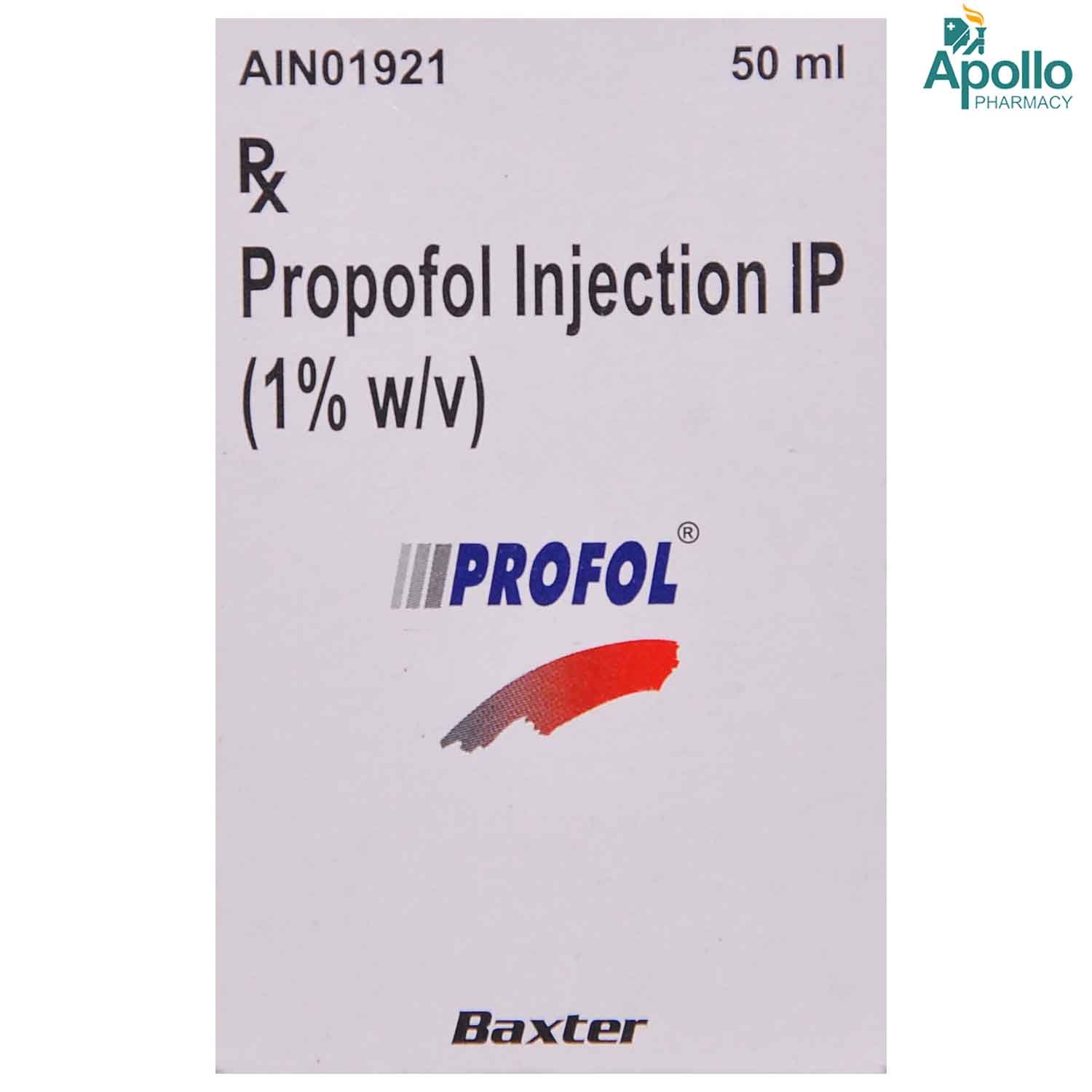Fresofol 1% Injection

MRP ₹136.5
(Inclusive of all Taxes)
₹16.4 Cashback (12%)
know your delivery time
Provide Delivery Location
Composition :
Manufacturer/Marketer :
Consume Type :
Expires on or after :
Return Policy :

Secure Payment

Trusted by 8 Crore Indians

Genuine Products
Therapeutic Class
Country of origin
Manufacturer/Marketer address
Disclaimer
Alcohol
Safe if prescribed
Fresofol 1% Injection can affect alertness if taken along with alcohol. So, the consumption of alcohol should be avoided as it might further reduce alertness.
Pregnancy
Consult your doctor
Fresofol 1% Injection is not recommended in the last trimester of the pregnancy as it may affect the baby's brain's growth.
Breast Feeding
Consult your doctor
Fresofol 1% Injection is known to pass through the breastmilk. So, it is not advised to take Fresofol 1% Injection during breastfeeding. Consult your doctor for further advice.
Driving
Safe if prescribed
Fresofol 1% Injection can affect alertness and coordination as it is known to cause drowsiness. So, operating machinery which requires concentration should be avoided.
Liver
Consult your doctor
Fresofol 1% Injection to be taken with caution, especially if you have had a history of liver disease. Your doctor will have to change the dosage depending on your medical condition and your reaction to treatment.
Kidney
Consult your doctor
Fresofol 1% Injection to be taken with caution, especially if you have had a history of kidney disease. Your doctor will have to change the dosage depending on your medical condition and your reaction to treatment.
Children
Safe if prescribed
Fresofol 1% Injection is not recommended for children below the age of 3 years. For children aged above three, take in dose and duration advised by a doctor.
Product Substitutes
About Fresofol 1% Injection
Fresofol 1% Injection belongs to a class of drugs known as 'general anesthetic', primarily used in giving anesthesia for major surgical procedures. It is given as induction therapy before surgery to sedate the patient. General Anaesthesia is a medication given before surgery to put you to sleep so that you do not feel the pain as you are unconscious.
Fresofol 1% Injection contains Propofol, which is used as an anesthetic for surgeries so that procedure is carried out without pain and distress. It works by causing loss of consciousness, which is reversible. It generally slows down the brain and central nervous system, which is the conscious center.
Take Fresofol 1% Injection as prescribed by your doctor. You are advised to take Fresofol 1% Injection for as long as your doctor has prescribed it for you, depending upon your medical condition. In some cases, you may experience dizziness, hypotension (low blood pressure), nausea, headache, vomiting, local site pain, changes in your breathing pattern, slow heartbeat. Most of these side effects of Fresofol 1% Injection do not require medical attention and gradually resolve over time. However, if the side effects are persistent, reach out to your doctor.
Do not take Fresofol 1% Injection if you are allergic to Fresofol 1% Injection or any of its ingredients. Fresofol 1% Injection should always be given by a doctor or a trained professional as over-dose can cause excessive sedation, which can be fatal. Do not drive a car or operate any machinery as Fresofol 1% Injection affects alertness. If you are pregnant, planning got conceive or are breastfeeding, Fresofol 1% Injection should be taken only after informing your doctor.
Uses of Fresofol 1% Injection
Medicinal Benefits Mweb
Key Benefits
Fresofol 1% Injection belongs to a class of drugs known as 'general anesthetic,' containing Propofol, primarily used in giving anesthesia for major surgical procedures. It allows the procedures to be carried out without pain and distress. It works by causing loss of consciousness, which is reversible. It generally slows down the brain and central nervous system, which is the conscious center. It is also used in people on a ventilator or who need critical care to sedate the patient.
Directions for Use
Side Effects of Fresofol 1% Injection
- Hypotension (low blood pressure)
- Nausea
- Headache
- Vomiting
- Dizziness
- Local site pain
- Changes in your breathing pattern
- Slow heartbeat
Drug Warnings
Do not take Fresofol 1% Injection if you are allergic to Fresofol 1% Injection or any of its ingredients. Fresofol 1% Injection should always be administered by a doctor or a trained professional as over-dose can cause excessive sedation which can be fatal. Do not drive or operate any machinery as Fresofol 1% Injection affects alertness. If you are pregnant, planning got conceive or are breastfeeding, Fresofol 1% Injection should be taken only after informing your doctor. Maintain a gap of 24 hours after using Fresofol 1% Injection and breastfeeding. The doctor will constantly monitor your blood pressure, oxygen level, breathing pattern and kidney function while the surgery goes on.
Drug-Drug Interactions
Drug-Drug Interactions
Login/Sign Up
Co-administration of Selegiline with Fresofol 1% Injection 20 ml may significantly affect the blood pressure.
How to manage the interaction:
Taking Selegiline with Fresofol 1% Injection 20 ml together can possibly result in an interaction, but it can be taken if a doctor has advised it. However, consult a doctor immediately if you experience any symptoms such as severe headache, blurred vision, confusion, fits, chest pain, nausea or vomiting, sudden numbness or weakness (especially on one side of the body), speech difficulties, fever, sweating, lightheadedness, and/or fainting Do not discontinue any medications without consulting a doctor.
Taking Tranylcypromine with Fresofol 1% Injection 20 ml may significantly affect your blood pressure.
How to manage the interaction:
Taking Fresofol 1% Injection 20 ml with Tranylcypromine is not recommended, but can be taken together if prescribed by a doctor. However, consult a doctor if you experience any unusual symptoms. Do not discontinue any medications without consulting your doctor.
Taking Phenylephrine with Fresofol 1% Injection 20 ml may lead to increased levels of phenylephrine leading to side effects like high blood pressure.
How to manage the interaction:
Taking Phenylephrine with Fresofol 1% Injection 20 ml is not recommended, but it can be taken if prescribed by the doctor. Do not discontinue the medications without consulting a doctor.
This raises the possibility of regurgitation while under anesthesia, leading to the inhalation of stomach contents into the lungs, which can result in lung inflammation or damage.
How to manage the interaction:
Talk to your doctor if you have any questions or concerns. Your doctor may be able to prescribe alternatives that do not interfere with the safety of your anesthesia. It is essential to inform your doctor about all other medications you are taking, including vitamins and herbal supplements. Do not stop using any medications without first talking to your doctor.
Drug-Food Interactions
Drug-Food Interactions
Login/Sign Up
Drug-Diseases Interactions
Drug-Diseases Interactions
Login/Sign Up
Drug-Drug Interactions Checker List
- RIFAMPICIN
- LORAZEPAM
- DIAZEPAM
- DILTIAZEM
- VERAPAMIL
- CIPROFLOXACIN
- FUROSEMIDE
- MIDAZOLAM
- ALPRAZOLAM
Habit Forming
Special Advise
- Do not self administer Fresofol 1% Injection. It should be done by a doctor only.
- Constant monitoring of breathing pattern, blood pressure, oxygen levels, kidney function is required.
Diet & Lifestyle Advise
- Do not consume alcohol while taking Fresofol 1% Injection as it might increase the sedation.
- Eat a low-calorie diet generally home-cooked for a speedy recovery.
- Avoid junk food, oily and spicy food as you have undergone surgery.
- Also, in case of sleep disturbances, try to spend time with family, which will change your mood and help you to fall asleep.
- Limit the screen time as it also alters your sleep cycle.
All Substitutes & Brand Comparisons
RX
Not for online saleMct-Rof 20ml Injection
Neon Laboratories Ltd
₹136
(₹6.12/ 1ml)
1% COSTLIERRX
Not for online saleNeorof Injection 20 ml
Neon Laboratories Ltd
₹136
(₹6.12/ 1ml)
1% COSTLIERRX
Out of StockNot for online saleFresofol 10mg Injection 50ml
Fresenius Kabi India Pvt Ltd
₹364
(₹6.55/ 1ml)
8% COSTLIER

Have a query?
Buy best Anaesthetics products by
Neon Laboratories Ltd
Themis Pharmaceutical Ltd
Troikaa Pharmaceuticals Ltd
Samarth Life Sciences Pvt Ltd
Abbott India Ltd
Astra Zeneca Pharma India Ltd
Baxter India Pvt Ltd
Core Claris Lifesciences Ltd
Celon Laboratories Pvt Ltd
Ajanta Pharma Ltd
Miracalus Pharma Pvt Ltd
Torrent Pharmaceuticals Ltd
Zydus Cadila
AP Pharmaceutical
Fresenius Kabi India Pvt Ltd
Galpha Laboratories Ltd
Indoco Remedies Ltd
Anglo French Drugs & Industries Ltd
B Braun Melsungen AG
Cadila Pharmaceuticals Ltd
Claris Lifesciences Ltd
Dr Reddy's Laboratories Ltd
Elder Pharmaceuticals Ltd
Fortel Life Sciences
Hetero Healthcare Pvt Ltd
Icpa Health Products Ltd
Pure Derma Healthcare Pvt Ltd
Salve Pharmaceuticals Pvt Ltd
Sunways (India) Pvt Ltd
VARENYAM HEALTHCARE PVT LTD
Wockhardt Ltd
Zydus Healthcare Ltd
6Ipain Healthcare Pvt Ltd
Admac Lifesciences(Oncology)
Aesmira Lifesciences Pvt Ltd
Albatross Healthcare Pvt Ltd
Amwill Healthcare Pvt Ltd
Anchal Life Science Pvt Ltd
Atopic laboratories Pvt Ltd
Biovenice Criticure
Cellgen Biopharma
Cipla Ltd
Delvin Formulations (P) Ltd
Entod Pharmaceuticals Ltd
Ethinext Pharma
Foremost Marketing Pvt Ltd
Fusion Health Care Pvt Ltd
German Remedies Ltd
Global Dent Aids Pvt Ltd
Greycells Lifesciences Pvt Ltd
Himeros Pharmaceuticals Pvt Ltd
Ici India Ltd
Icpa Lab
Ikon Remedies Pvt Ltd
Intas Pharmaceuticals Ltd
Kopran Laboratories Ltd
Kshipra Health Solutions
Leeford Healthcare Ltd
MSP Pharmaceuticals
Medimarck Biotech
Modi Mundipharma Pvt Ltd
Mylan Pharmaceuticals Pvt Ltd
Optima Healthcare Solutions
Pericles Pharma
Pharmadent Remedies Pvt Ltd
Piramal Enterprises Ltd
Pristine Pearl Pharma Pvt Ltd
Questus Pharma Pvt Ltd
Ranbaxy Laboratories Ltd
Rusan Healthcare Pvt Ltd
Scott Edil Pharmacia Ltd
Skinocean Pharmaceuticals
Themis Chemicals Ltd
Themis Medicare Ltd
Ultra Drugs Pvt Ltd
Vhb Life Sciences Inc
Zee Laboratories Pvt Ltd








